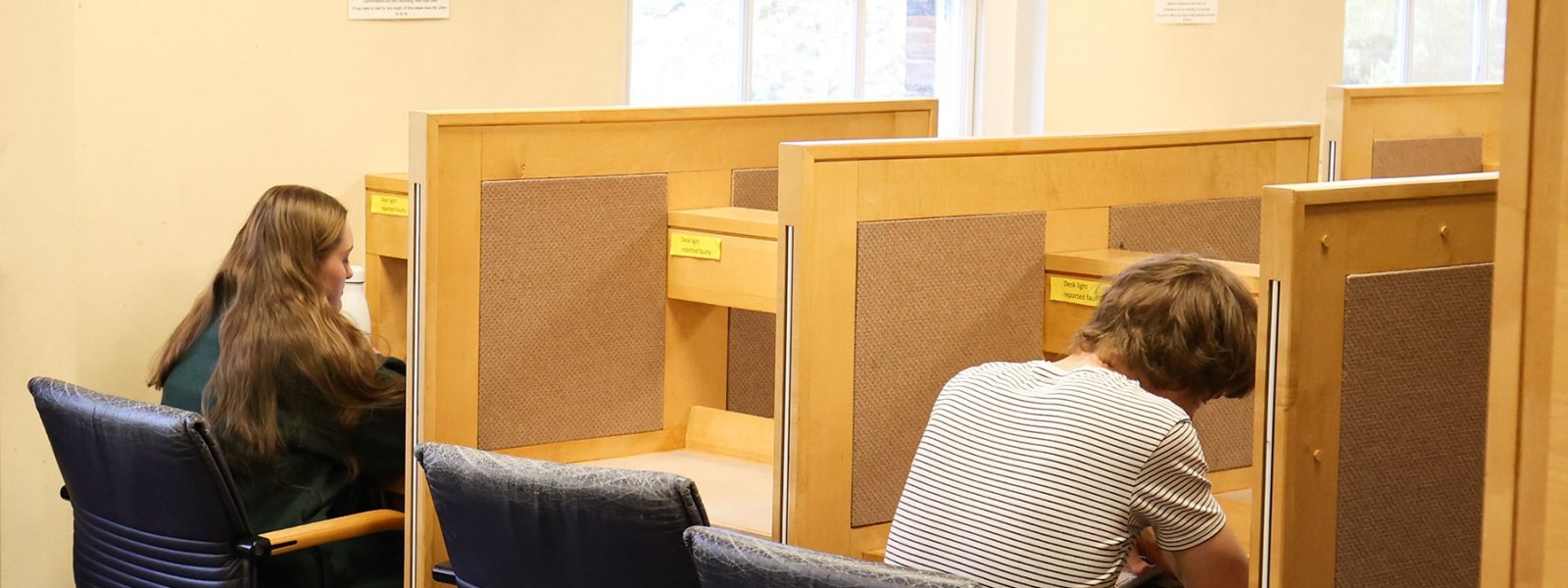The University organises assessment and the awarding and classing of degrees; the College helps you prepare to achieve your best.
The University Examinations website is the source of record for all central arrangements relating to student assessment. It includes information about the following:
- exam timetables and exam sites
- rules for guidance of candidates
- graduate and undergraduate exams
- faith provision in University exams
- practical instructions
- tripos, disregard terms, conduct etc
- examination access arrangements
While several courses include an element of assessed coursework (dissertations, projects, essay portfolios) the second half of the Easter Term (typically from mid-May to early June) is the period during which undergraduates sit written examinations covering the material for the whole year.
Key College provisions relating to the main examination period include the following:
- Mobile phone numbers
Students should keep their contact details up-to-date in CamSIS; this is particularly important during Easter Term.
- Alternative study spaces
The Library and Computer Suite are intended for individual quiet study, so other College spaces are available for group work. Additional study spaces are coordinated by the Librarian; further information can be found on the Library webpage.
- Event Permissions
To preserve the College as a quiet place for study and rest, only a restricted number of small and quiet events may be granted permission from the Monday of the week before the beginning of Full Term to the last examination date.
Further details can be found in the Event Permission Policy in the College's Whitebook.
- Ill health during exams
Illness in advance of the exams
The most important thing is to let your Tutor, the Nurse or Chaplain/Pastoral Tutor know if your preparation or performance might be affected by any of the following:
- illness
- mental health issues
- severe mitigating circumstances (for example, bereavement)
They may advise you to obtain medical evidence to support your case. College may submit a 'warning' to the University. These are not disclosed to examiners; they will only be acted on if, when you receive your results, you think they were affected by the circumstances described.
Illness on the day of the exams
If you are ill on the day of the exam it is vital that you report to the Nurse or the Tutorial Office at least 30 minutes before the start of your exam.
You should try to remain calm and remember that College staff are used to dealing with difficulties in exam time
Any arrangements will depend on the nature and severity of your condition, but every effort will be made to enable you to take or complete your exams.
Illness in the exam
If you are ill during an exam, you must alert an Invigilator, and must not leave the exam hall without informing an Invigilator that you are ill.
The Invigilator may be able to arrange for you to continue the examination when you feel better.
- What to do if things go wrong
You must inform your Tutor as soon as possible about any circumstances that affected your performance and s/he will be able to advise you on what happens next.
The University Exam Access and Mitigation Committee has produced Guidance about the process that takes place when a candidate has experienced extenuating circumstances. Your Tutor will keep you updated on the status of any application made on your behalf.
You may also find it helpful to speak to the Chaplain/Pastoral Tutor about any mitigating circumstances, such as bereavement; especially if the pressure of examinations has not given you time to grieve.
Tripos
In order to achieve an Honours degree you must pass examinations at both Part I and Part II.
There are no re-sits; and it is important, therefore, that students should be clear about what happens when:
- illness or other grave cause renders a student unfit to study during the year, or prevents them from sitting exams successfully at the end of the year;
- something goes badly wrong in the conduct of examinations (major disruption to exam arrangements, mistakes in the exam paper, suspected mismarking).
In all but the most extreme of cases, Tripos has no compensating mechanism for even serious examination underperformance, as long as the student still achieves Honours.
The College will be able to write a strong reference stating the true academic calibre of that student, using evidence from previous years' Tripos results, Camcors reports and from Academic Reviews, and from the DoS's personal acquaintance with the student.
This is one important reason why you, your supervisors, and your DoS should take those processes seriously.
There are a variety of ways to deal with likely or actual failures to achieve honours through illness or other grave cause all of which are determined by the University's Exam Access and Mitigation Committee, in response to a submission by the College on a student's behalf.
For further information and advice, please contact your Tutor.
Illegible Scripts
Please be aware that you may be called back to the College if your written exam script is illegible and needs to be transcribed. The University expects a 48 hour turn around if this is the case, so if your handwriting is a cause for concern, please keep this in mind if you are planning any holidays straight after your exams.
- Degree certificates and transcripts
All students will be issued one free copy of their degree certificate upon graduation. One free copy of your academic transcript will also be posted to you within four weeks following congregation.
Further details on how to obtain a copy of your transcript can be found on the University website.
